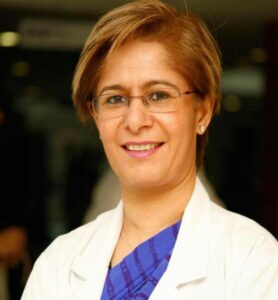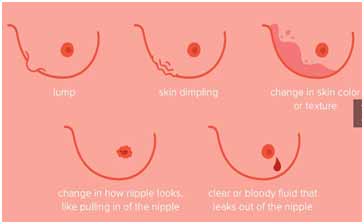 Dr Bhawna Sirohi, Medical Oncologist- Breast Cancer, Apollo Proton Cancer Centre, Chennai
Dr Bhawna Sirohi, Medical Oncologist- Breast Cancer, Apollo Proton Cancer Centre, Chennai
The cancer burden in India has doubled over the last two decades, with breast cancer being the commonest among urban Indian women.
On an average, 1 in 60 women in rural India compared to 1 in 25 women in urban India will develop breast cancer.
There has been a social and cultural change with migration to urban areas, higher education, office sedentary work, late marriages which has led to women not being able to maintain a healthy weight, eating fast food, use of tobacco/alcohol, long-term use of oral contraceptive/ hormone replacement pills, not breast feeding and some reproductive factors like delayed child birth, lesser number of children (an average of 2.1 children in her lifetime for women in urban compared to 3.0 children in rural India).
Most of these can be addressed with active and balanced lifestyle which includes – SEED (Sleep, Exercise, Emotional health and Diet).
YOU MAY LIKE TO READ: Cancer Prevention: Do’s and Don’ts For Women
Inflammatory Breast Cancer Is Rare But Aggressive
Among the various types of breast cancer that have been described, inflammatory breast cancer (IBC) is rare but is aggressive and needs prompt diagnosis and treatment. The principles of treating the IBC do not differ from other breast cancers – patients must be treated in a multi-disciplinary team setting which includes a breast surgeon, radiation and a medical oncologist.
Do NOT hesitate to take a second opinion if the breast pain or symptoms (even if there is no lump) are not getting better over a period of few weeks. Early diagnosis of breast cancer translates into high cure rates and low cost of treatment.

Facts
- IBC is different from other forms of breast cancer because it usually does not cause a lump or mass. Patients present with redness, dark discoloration of skin on breast, orange peel like skin appearance , increase in size of breast, inverted nipple, swelling around the armpit or collar-bone.
- IBC may not show up on a mammogram.
- IBC grows and spreads more quickly than other types of breast cancer.
- IBC at diagnosis is usually at a locally advanced stage as the cancer cells have infiltrated the skin, hence prompt diagnosis and treatment is crucial.
- Unlike other breast cancers, patient may present with pain, tenderness and breast itchiness.
- It is often misdiagnosed as an infection (Mastitis) and women given multiple courses of antibiotics and anti-TB medicine. If the redness or pain does not get better over a course of antibiotics, take specialist advice immediately.
- On clinical exam, one breast may look larger than the other and feel heavier and warmer than the other.
- IBC is usually treated with chemotherapy first. If the cancer has not spread to other areas of the body, chemotherapy is followed by surgery and radiation therapy. Targeted treatment or immunotherapy is added based on the receptor status.
YOU MAY LIKE TO READ: Breast Cancer On The Rise: 1 In 22 Urban Indian Women Likely To Develop The Disease, Says Expert
Differentiating Features between Mastitis and Inflammatory Breast Cancer
Following table has some differentiating features between Mastitis and IBC though some symptoms and signs may overlap, hence specialist input is necessary:
| Symptom | Mastitis | Inflammatory breast Cancer |
| Pain | Yes | Yes |
| Swelling | Yes | Yes |
| Redness | Yes | Yes |
| Fever | Yes | No |
| Headache | Yes | No |
| Nipple discharge | Yes | No |
| Common in | Breastfeeding women | Younger women, overweight or obese |
| Orange peel like skin | No | Yes |
| Inverted nipple | No | Yes |
| Antibiotics | Symptoms should improve within a few days | Will not respond and needs anti-cancer therapy |
DO NOT LET THE FEAR OF COVID STOP YOU FROM SEEKING MEDCIAL ADVISE AS CANCER DETECTED EARLY IS CURABLE
(For video and tele-consults, call 07577805172 for appointments)
Resources: IBC network Foundation https://www.theibcnetwork.org/











